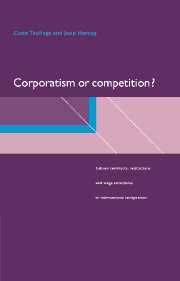 Corporatism or Competition?
Corporatism or Competition? Published online by Cambridge University Press: 23 November 2009
Introduction
As discussed in chapter 1, interest in interindustry differentials was revived by the Krueger and Summers (1988) paper. But the stability of such differentials had certainly not gone unnoticed before. The OECD Employment Outlook devoted a chapter to it in 1984 (OECD, 1984b), drawing attention to stability of the differences as well as differences between countries. These differentials are an anomaly in simple Walrasian models. The market should compete away all pay differentials for equally skilled workers. Even more remarkably, our results in chapter 1 show that the magnitude of the industry differentials is highly correlated with the degree of corporatism in wage setting in a country. Countries with centralized institutions have smaller industry differentials than those with decentralized institutions.
In this chapter, we consider an explanation for this pattern. When workers capture part of the rents of the firm, industries with high rents pay higher wages than industries with lower rents. Differentials in rents across industries would therefore be an explanation for differentials in wages in a given country. When workers' share in the rents differs across countries, this would explain the variation in industry differentials across countries. This is consistent with the theoretical model set out in chapter 2. Corporatist institutions allow a transfer of the task of adjusting nominal contracts to aggregate shocks to higher-level organizations. Because contract renegotiation is accomplished or supervised by higherlevel organizations, local bargaining power of the union is far less relevant, and there is less scope for sharing in local rents.
To save this book to your Kindle, first ensure [email protected] is added to your Approved Personal Document E-mail List under your Personal Document Settings on the Manage Your Content and Devices page of your Amazon account. Then enter the ‘name’ part of your Kindle email address below. Find out more about saving to your Kindle.
Note you can select to save to either the @free.kindle.com or @kindle.com variations. ‘@free.kindle.com’ emails are free but can only be saved to your device when it is connected to wi-fi. ‘@kindle.com’ emails can be delivered even when you are not connected to wi-fi, but note that service fees apply.
Find out more about the Kindle Personal Document Service.
To save content items to your account, please confirm that you agree to abide by our usage policies. If this is the first time you use this feature, you will be asked to authorise Cambridge Core to connect with your account. Find out more about saving content to Dropbox.
To save content items to your account, please confirm that you agree to abide by our usage policies. If this is the first time you use this feature, you will be asked to authorise Cambridge Core to connect with your account. Find out more about saving content to Google Drive.